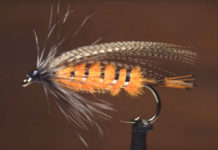BRAINTREE — You might say Cathy MacCurtain’s grandfather, Albert Savard, a salty New Hampshire native, did her a big favor when he refused to take her fly fishing 55 years ago .
“I used to beg him to let me go, but he said I’d be too noisy and would scare the fish away,” MacCurtain, 62, said. “I asked and asked and he never, ever would let me go. It broke my heart, but I do have his heirloom bamboo rod. It was just something I always wanted to do . . . on my bucket list.”
Growing up in Roslindale, MacCurtain fished with a spincast rod when she and her five siblings visited their grandfather in Chocorua, New Hampshire, every summer. She graduated from the University of Massachusetts-Boston and Suffolk Law School; her son Lawrence was born in 1988 while she was in law school. She did not practice law, but worked part-time for law firms while raising her son. Finally, in her late 50s, the longing to try fly fishing overtook MacCurtain after her husband, Jerry, gave her her first fly rod.
She bought a book on fly fishing to teach herself how to cast a fly rod and, after several failed attempts, she tried training videos but struggled with the basics. Then, in 2018, she saw a notice about fly fishing classes at the now-closed Orvis store in Dedham and signed up.
“I just took to it,” she said. “I was fascinated and just kept going, We learned about the gear you needed, how to set up your rod and reel, how to tie some basic knots and the primary flies needed to start fishing.The instructors gave us a fly rod and then took us outside to learn the basic casts.”
MacCurtain continued to practice her casting in her backyard and signed up for Orvis’ more advanced Fly Fishing 201 class. That included a trip to Houghton’s Pond in Milton “for our first fishing experience trying to catch a fish on a fly. Although I did not catch a fish that day, I was hooked and continued to practice my casting whenever I had time. At home, I would practice tying knots over and over to master them.”
On a snowy January day in 2019, she read the book “The Feather Thief” about the underworld of fly tying and the illegal use of feathers from birds on the endangered list.
“The book was so riveting, I finished it in one day,” she said.
A year ago in February, she signed up for additional Orvis classes on fly tying.
“The first class we learned how to tie a Woolly Bugger, which is a basic fly that can catch almost any freshwater fish,” she said. “After the class, Orvis gave us a discount coupon for a fly-tying kit, and I jumped on it. I bought the kit, which included all the basic tools, an instructional DVD, and all the materials to tie 160 flies. I began tying basic flies and worked my way up to tying the more advanced flies. Since then, I have tied hundreds.”
Last fall, she was offered a seasonal job at the now-closed Orvis store in Legacy Place.
“It was a fantastic opportunity because I was able to continue to learn more about fly fishing and fly tying,” she said.
The employee discount allowed her to get all the gear both she and her husband needed. She caught her first trout when the Orvis store’s fly fishing manager, Casey Breeds, took her to the Farmington River in Connecticut a year ago.
“It was very exciting, it was an incredible experience,” she said.
Shortly after the pandemic began in Massachusetts, she found “a great distraction in focusing on perfecting the art of tying flies.”
This past year, as soon as the weather was warm enough, she began fly fishing once a week with another woman she met in her classes. Claudia Rivas, of Chelsea, would meet her at Houghton’s Pond, and when time permitted, they’d travel to the Swift River in Belchertown in Western Massachusetts on the weekends.
“It’s a great escape. I just can’t wait to go every week,” she said. “When you are fly fishing, you are so busy thinking about what bug is out there. You look in your fly box and see if you have anything resembling those bugs. You are looking at the water seeing where the fish might be; fish are constantly moving. I can be out there for four hours and don’t even know it because I am so engaged in fishing.”
On weekends and holidays, she and her husband go to the Swift River, which is known for its icy water from Quabbin Reservoir and is especially good for catching trout.
“It’s a lot more fun if you catch a fish, but that’s not really what it is about,” MacCurtain said. “If I catch a fish with a fly that I have tied, it’s just an amazing feeling. To feel the rod tug, and then you’re pulling in, and the fish is fighting you and you are bringing it in, bringing it in. … It is very satisfying.”
She always uses barbless hooks and practices catch and release.
“It’s the only thing I’ve ever done where I could totally be relaxed, I will say,” she said. “I am always checking the weather a couple days ahead of time.”
Credit: Source link































